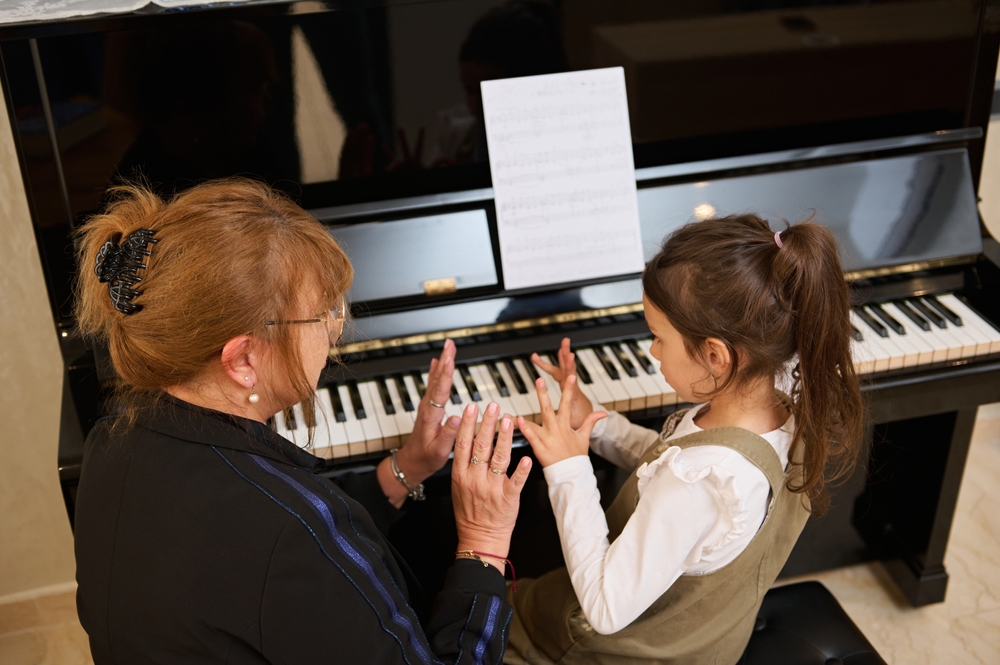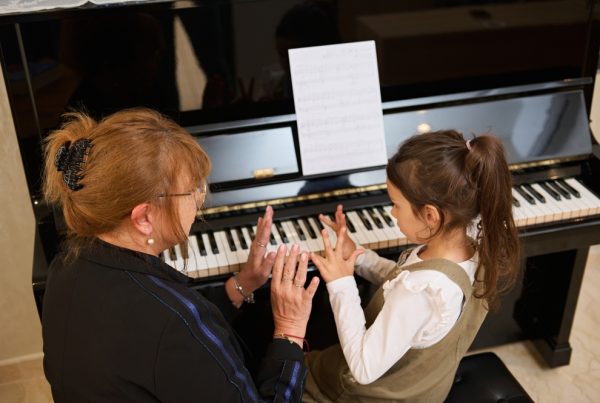This comprehensive guide provides an in-depth look at piano lessons at home for kids, exploring the benefits, methods, and practical tips for parents. It focuses on choosing the right teacher, understanding the Volz Piano Method and its unique approach to teaching children in their own homes, and offering actionable advice to support your child’s musical journey. Whether you’re a parent looking to introduce your child to piano or seeking to enhance their learning experience, this blog post is your go-to resource.
Table of Contents
- Introduction
- Benefits of Piano Lessons for Children
- Why Choose At-Home Piano Lessons?
- Cost Considerations for At-Home Piano Lessons
- How to Find the Right Piano Teacher for Your Child
- Understanding the Volz Piano Method
- Setting Up a Home Practice Space
- Tips for Parents to Support Their Child’s Piano Learning
- Common Challenges and How to Overcome Them
- FAQs about Piano Lessons at Home for Kids
Introduction
Welcome to our comprehensive guide on piano lessons at home for kids. In today’s fast-paced world, finding the right balance between education and convenience is crucial, especially when it comes to nurturing your child’s talents. At-home piano lessons offer a unique blend of personalized instruction and the comfort of learning in a familiar environment. This blog post will delve into the myriad benefits of such lessons, help you find the right teacher, explore different teaching methods, and provide practical tips for parents to support their child’s piano learning journey.
Volz Piano stands out with its complete Volz piano method for kids, designed to cater to each child’s strengths, and offers the convenience of “Piano Teachers that Drive to You,” ensuring lessons are delivered right to your doorstep. Whether you’re looking for affordable piano lessons at home for children or beginner piano lessons for kids at home, this guide covers it all.
Benefits of Piano Lessons for Children
Piano lessons for kids, especially children’s piano lessons at home, offer numerous advantages that extend beyond music. Learning piano enhances cognitive development, including memory, concentration, and problem-solving skills. Emotionally, piano lessons allow kids to express their feelings, reducing stress and boosting self-esteem. Playing piano can help relax children, especially those who love music, and improve mood, particularly for kids with anxiety or mood disorders. Socially, group piano lessons for kids at home or recitals foster cooperation, communication, and interaction with peers and teachers, enhancing social skills. Additionally, piano lessons teach discipline and time management, crucial for learning piano at a young age.
Why Choose At-Home Piano Lessons?
Opting for at-home piano classes for children offers significant advantages, making in-home piano lessons for kids a popular choice. The primary benefit is convenience; parents save time and energy by not needing to travel, especially beneficial for busy families. Children learn in a familiar, comfortable environment, reducing anxiety and enhancing focus, which is ideal for piano tutoring for kids at home.
Personalized learning is another key benefit, with teachers tailoring lessons to the child’s pace and style, ensuring effective home-based piano lessons for kids. Safety is also a factor, as lessons can be conducted without leaving home. For homeschooling families, at-home lessons complement their curriculum, offering flexible schedules. Volz Piano’s “Piano Teachers that Drive to You” service exemplifies this convenience, delivering doorstep piano lessons for kids directly to your home.
Cost Considerations for At-Home Piano Lessons
The cost of piano lessons for kids in your home can vary based on several factors, including the teacher’s experience, lesson duration, and location. On average, 30-minute lessons range from $20 to $50, while 60-minute lessons can cost $40 to $90, with at-home lessons being 10-20% pricier due to travel costs. Volz Piano offers competitive pricing, with lessons ranging from $29 to $45 per half hour, and includes multi-student discounts and accepts the Utah Fits All Scholarship, enhancing affordability for affordable piano lessons at home for children.
Other costs to consider include the piano or keyboard, with options like MIDI keyboards under $50 or full-sized weighted keyboards from $200 to $600, and annual tuning costs of $100 to $200. Sheet music and metronomes (around $10–$50) may also be needed. Comparing costs, at-home lessons can be cost-effective when factoring in saved travel expenses, making one-on-one piano lessons for children at home a viable option.
How to Find the Right Piano Teacher for Your Child
Finding the best piano teachers for kids at home is crucial for your child’s success. Look for teachers with formal training, experience with children, and a teaching style that matches your child’s needs, such as child-friendly piano instruction. Communication and rapport are essential, ensuring the teacher can build a positive relationship with your child. Availability and scheduling should fit your family’s routine, and cost should align with your budget, considering options like mobile piano teachers for kids who travel to your home.
Volz Piano’s teachers are carefully selected and trained, offering piano teachers that come to your house for kids, ensuring convenience and quality. Ask for references or reviews to gauge their reputation, and consider a trial lesson to assess compatibility. This process helps ensure effective piano instruction for children at home, tailored to your child’s learning style.
Understanding the Volz Piano Method
The Volz Piano Method, offered by Volz Piano, is designed specifically for kids, focusing on their strengths through reading, composing, hearing, and arranging. Reading emphasizes sheet music for those who excel in it, while composing teaches patterns and laws of music, fostering creativity. Hearing involves ear training to leverage natural talent, and arranging allows modifying pieces into new music, ensuring interactive piano lessons for kids.
This method leads to rapid advancement, improved sight reading, and increased enjoyment, with students performing impressive pieces and developing a love for music. Volz Piano accepts the Utah Fits All Scholarship, making Volz piano method for children accessible. It’s ideal for at-home learning, with teachers delivering lessons through their “Piano Teachers that Drive to You” setup, ensuring piano lessons delivered to your home for kids are effective and engaging.
| Aspect | Description |
|---|---|
| Method Name | The Complete Volz Piano Method for Kids |
| Focus Areas | – Reading: Teaches sheet music reading, emphasized for students who excel in it. – Composing: Teaches composition and understanding patterns/laws of music. – Hearing: Trains ear playing, elevating performance levels. – Arranging: Involves tweaking existing pieces to create new music. |
| Benefits | – Rapid advancement and increased enjoyment. – Improved sight reading for struggling students. – Students perform impressive pieces. – Learn composition, Jazz, ear training, arranging, and reading. – Regular practice and engagement. – Develops love for music and confidence in skill improvement. |
| Testimonials | Quote: “My teacher helps me find what I’m good at and to think outside of the box” – Phil Martinez Lucy, age 11. |
| Additional Info | Accepts Utah Fits All Scholarship for piano lessons. |
Setting Up a Home Practice Space
Creating a conducive environment is key for effective kids piano lessons at home. Choose a quiet location with minimal distractions, ensuring good lighting for reading music, and set up a comfortable seating arrangement. Select a suitable instrument, such as a full-sized weighted keyboard ($200–$600) or an upright piano ($2,000–$10,000+), depending on your budget. Organize music books and materials, and consider adding a metronome ($10–$50) for practice.
This setup enhances focus and engagement, supporting home music lessons for children. Ensure regular maintenance, like annual tuning ($100–$200), to keep the instrument in top condition. Volz Piano’s method can be seamlessly integrated into this space, with teachers visiting for in-home piano tutoring for children.
Tips for Parents to Support Their Child’s Piano Learning
Parent involvement in kids’ piano lessons is vital for success, especially for children’s piano education at home. Establish a consistent practice routine, starting with 15-30 minutes daily, and make practice fun with piano games for children learning at home, like using apps or rewards. Set realistic goals to boost motivation, and be patient, offering praise to encourage progress.
Attend lessons when possible to understand the curriculum, and provide a supportive environment, ensuring at-home piano practice for kids is enjoyable. Volz Piano’s method, with its focus on child-friendly piano instruction, can be supported by parents through regular check-ins and celebrating milestones, enhancing the learning experience for piano lessons for kids with special needs at home if required.
Common Challenges and How to Overcome Them
Learning piano at home can present challenges, but with the right strategies, they can be managed. Lack of motivation is common; keep lessons interesting with fun ways to teach piano to children, like choosing songs your child loves or using interactive piano lessons for kids. Difficulty with skills like hand coordination can be addressed by breaking tasks into smaller steps, and time management can be improved by integrating practice into daily routines.
Frustration or plateaus can be overcome by setting small goals and celebrating achievements, ensuring encouraging kids to play piano remains a positive experience. Volz Piano’s traveling piano instructors for children can help, offering personalized support during lessons, making advanced piano lessons for children at home more manageable.
FAQs about Piano Lessons at Home for Kids
Children can start as early as 4 or 5, but the ideal age is around 6 or 7 when they can focus and have developed motor skills, suitable for beginner piano lessons for kids at home.
Daily practice sessions of 15-30 minutes are recommended for beginners, ensuring consistent progress in children’s piano lessons at home.
A keyboard, especially a full-sized weighted one ($200–$600), is sufficient for beginners, but a real piano offers better sound quality for advanced learners.
Look for improved skills like reading music, playing new pieces, and increased confidence, with regular feedback from teachers during piano lessons for kids near me at home.
Discuss their feelings, address any issues, and consider a break or trying a different teacher/method, like Volz Piano’s approach, to reignite interest in at-home piano classes for children.



